The world is a rich tapestry of colors and textures, but for those who have cataracts, this brilliant show may seem as a muted, hazy haze. When the natural lens of the eye gets clouded, a condition known as cataracts may severely impair vision, making daily activities difficult and lowering quality of life.
Understanding the Nature of Cataracts
When proteins in the normal lens of the eye degrade and clump together, cataracts form, impairing vision. Factors including age, diabetes, smoking, prolonged sun exposure, and some drugs might hasten this process. Usually, the clouding advances gradually, giving an opportunity for intervention before it significantly affects day-to-day activities. If left untreated, the early symptoms—which include light sensitivity, hazy vision, and trouble seeing at night—can become worse. Early detection of these symptoms is essential for prompt treatment. Early detection of cataracts via routine eye exams allows for efficient treatment.
The Role of Lifestyle Changes in Managing Cataracts
A major factor in controlling cataracts and maintaining eyesight is making deliberate lifestyle changes. Consuming a diet high in vitamins, minerals, and antioxidants may help maintain eye health and reduce the development of cataracts. Nutrients good for the eyes may be found in foods, including citrus fruits, carrots, and leafy greens. Keeping a healthy weight and controlling illnesses like diabetes might also lower the chance of cataract development. Another important step is shielding the eyes from UV radiation. Wide-brimmed hats and sunglasses with UV protection may protect the eyes from direct sunshine and stop further damage. Given that smoking is a significant risk factor for cataract development, quitting is equally vital.
Exploring Non-Surgical Treatment Options
Even while cataract surgery is a very successful treatment, non-surgical methods, particularly in the early stages, may significantly relieve symptoms and enhance vision. Clarity and focus may be improved by using prescription glasses or contact lenses to rectify refractive faults brought on by cataracts. Lenses with anti-glare coatings may help make everyday tasks easier by reducing light sensitivity and improving night vision. The advancement of cataracts may be slowed by medications, such as eye drops, that include anti-inflammatory or antioxidant qualities. By lowering oxidative stress in the eye, these drops hope to maintain the lens’s clarity. Furthermore, a few lifestyle adjustments, such as utilizing reading glasses and improved lighting at home, may greatly improve the quality of life for those who have cataracts.
Advancements in Cataract Surgery
Over time, cataract surgery has seen tremendous development and is now a very successful method of vision restoration. The artificial intraocular lens (IOL) is implanted in its place during the surgery, which involves removing the clouded natural lens. This operation has a high success rate and little recovery time; it is often done as an outpatient procedure. IOLs come in a variety of forms thanks to technological developments, with each one intended to address a particular visual need. Multifocal and accommodating IOLs give a wider range of vision, whereas mono-focal IOLs only provide clear vision at one distance, usually rather distant. Concentric rings on multifocal IOLs provide sharp vision at various distances, eliminating the need for spectacles. By imitating the natural lens’s capacity to alter form, accommodating IOLs provides a more smooth transition between various focus points. Thanks to these advancements in cataract surgery and the skills of trained cataract surgeons, patients may now restore a high degree of visual function.
Post-Surgery Care and Long-Term Eye Health
Cataract surgery is not just successful in the operating room; post-surgical care is also essential to achieving the best possible results. Patients need to follow their doctor’s recommendations after the treatment, which include using the recommended eye drops to lessen irritation and avoid infection. It’s also crucial to shield the eyes from harm and refrain from demanding tasks when they’re first healing. Regular check-ups and the adoption of healthy practices may help sustain long-term eye health. The new lens’s health may be preserved, and other eye disorders can be avoided with continued UV protection, a healthy diet, and cessation of smoking. It’s crucial to keep an eye out for any changes in eyesight and to get medical help right away if anything seems wrong. People who prioritize their eye health may benefit from greater eyesight and a higher standard of living.
Conclusion
Despite being a prevalent ailment, cataracts do not always result in a permanent loss of eyesight. People with cataracts may still see the world in all its vivid clarity and overcome its problems with prompt diagnosis, adequate treatment, and dedication to eye health.



